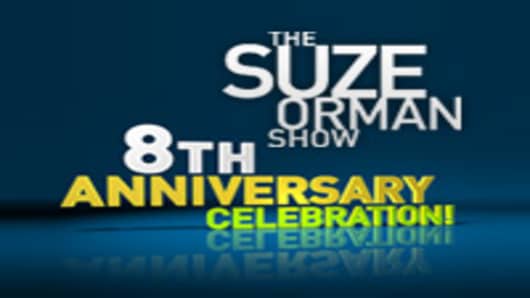So even after giving financial advice for going on three decades now, it doesn't sound like you've hit a wall where you say "I am sick of hearing these same questions over and over again, are you people not listening to what I'm saying?" It sounds like it's still new and fresh to you.
Yeah, I love it. I love it. I love when we're stopped on the street and people come up to me. Whether it's snowing, whether it's freezing out, I will always take time to answer their questions. I'm always the last person to leave an event.
At a book signing — remember I've done nine books so I've done many book signings — to this day, I will stay and close down that bookstore to make sure every single person that wants to gets their book signed. You don't do that when you think it's just a job. You do that because you love what you're doing, and I love what I'm doing and I care about what I'm doing. I care about every caller, every e-mailer, every Tweeter.
How many of your Tweets do you respond to?
Every single one of them. And by myself, too. I've Tweeted over 11,000 times and I don't think people really believe it's me, but it absolutely is. Nobody else touches my Twitter site but me, period. Even when Amy (Feller, Executive Producer of The Suze Orman Show) wants to make an announcement about the show, she sends an e-mail to me and I Tweet it.
What's the one question you've never been asked in an interview that you'd like to answer?
If I were to be asked what's the most important thing in life. I've never been asked that, and I think a lot of people would think Suze Orman would say money. But I wouldn't. I would say that the most important thing in life is truthfulness and honesty. I'd say the most important thing in life is doing what is right versus what's easy. And if you can always come from a place of honesty, if you can always come from the truth, if you can always honor the people and places and serve them and the times around you, then you'll live the wealthiest life you possibly could. so the most important thing in life to me is honesty and truth. Not money.
What's the key to the success of the Suze Orman show?
Listen, the Suze Orman Show started at MSNBC in a makeshift studio that wasn't even our studio with Dan (Switzen) the director, Amy Feller the executive producer and a few other people. To this day, Dan is still the director, Amy Feller is still the executive producer. To this day, we're a small group that respect each other and love each other. And the reason that the Suze Orman Show is successful is because of the people who work behind it.
We're not out to hurt one another, we stick by one another, we understand when something goes wrong — nobody is yelled at, nobody is degraded — and every single person is respected. Because behind the scenes there is honoring going on, when you watch it you feel special because the people putting out the show feel special. That's the key to the success of this show.
So what's next for the show? Are you going to keep doing what you're doing? Do you see any new adventures, any new direction?
As far as the show goes, I hope it goes on for as long as it makes sense and our ratings still make us the No. 1-rated show on CNBC.
Suze, how much preparation do you do before each show?
The "Can I Afford It" segments — I get a packet this thick on each person so that I know every single thing about the people before I approve or deny them. Now obviously, we don't show that on screen because there's only so much time. But I know who I'm going to approve or deny before we ever go on the air.
The one main guest at the front of every show, I know everything about them as well. And Amy and I and the producers will talk about them in great detail to decide which direction should we go, what do you think, and things like that.
As far as the call-ins, I do not have a clue what those are. So every call is taken on the spot, live. There isn't as much preparation as one might think. I'm not a teleprompted talent in most cases, so what you see, especially the openings, come straight from the heart and are not scripted.
That's a lot of pressure.
No, it's just a lot of truth. That's another reason why I think the show is successful. I'm not reading a teleprompter, I'm talking to the camera, I'm talking into the soul of the person looking. I'm not looking at words — I'm looking at you.


